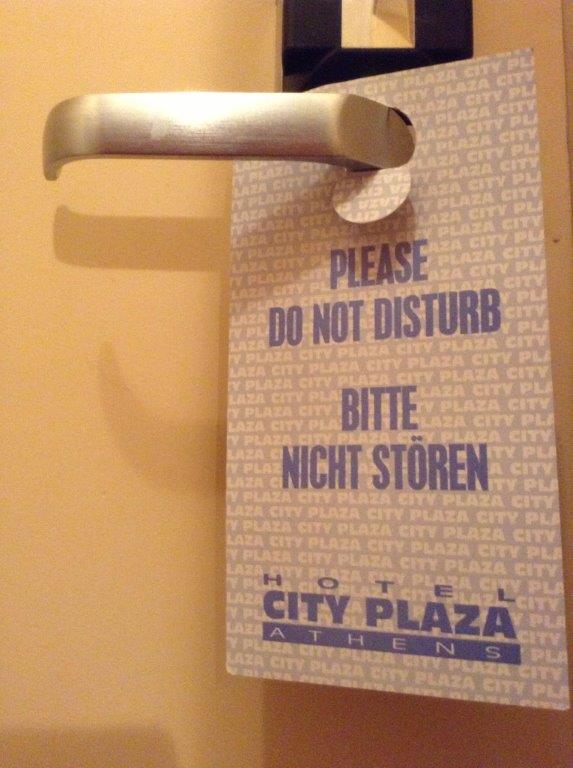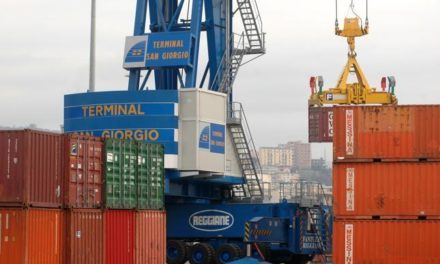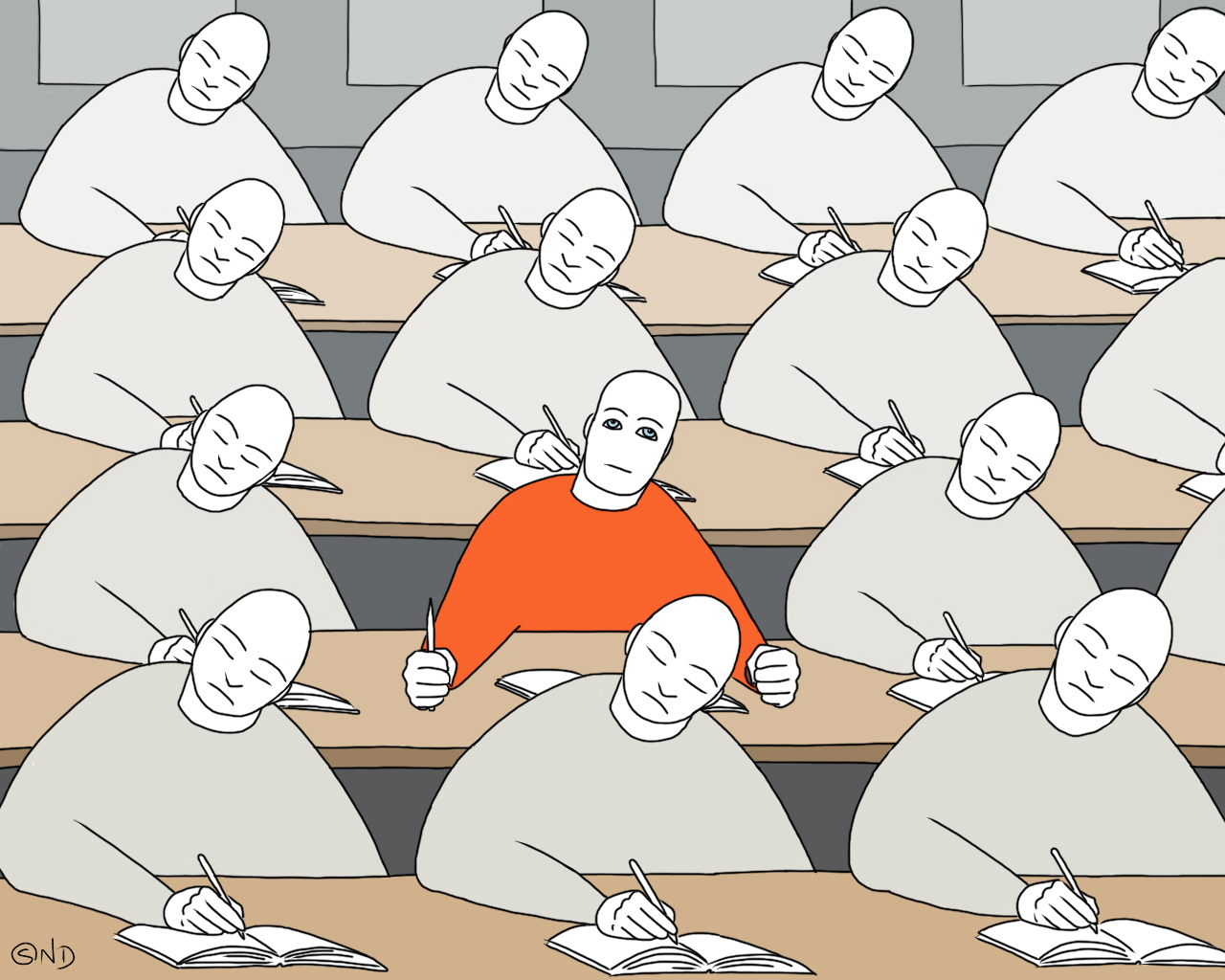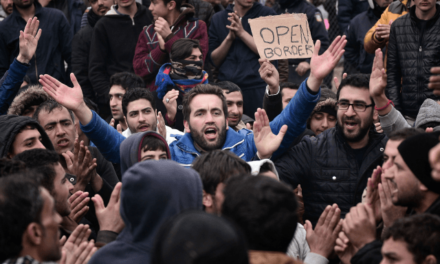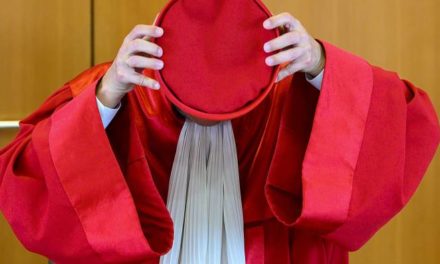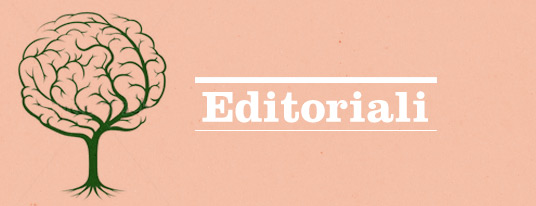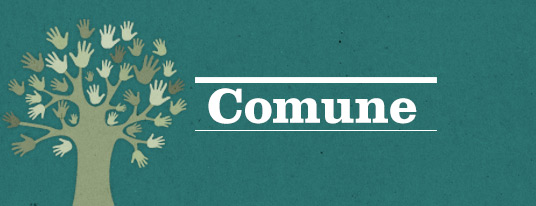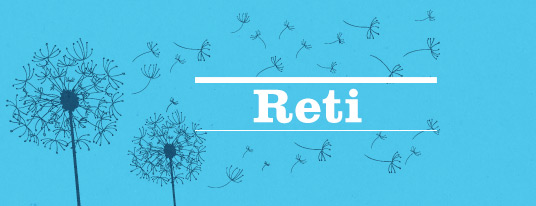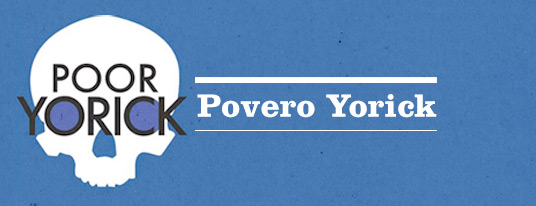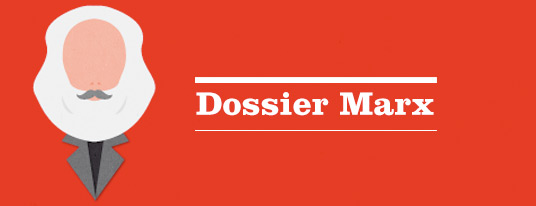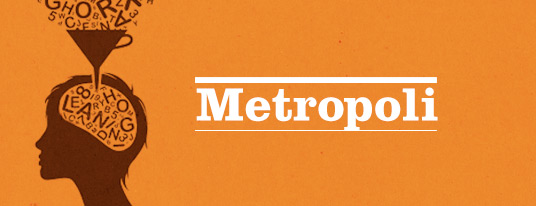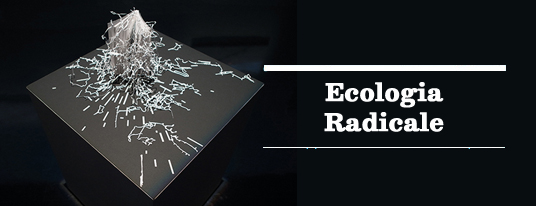di INFOMOBILE*.
The City Plaza squat at 78 Acharnon celebrates its first month. The hotel now houses refugee families totalling 385 people, including 180 children. These include 22 single parent families, as well as people with disabilities. The nationalities that make up City Plaza include Afghans, Kurds, Syrians, Palestinians, Iranians, Iraqis and Pakistanis. The families being housed at City Plaza were selected on the basis of their previous “housing” arrangement as well as on the particular problems being faced by each one. Each family lives in a separate room of the hotel, while all inhabitants are provided with breakfast, lunch and dinner, as well as with hygiene products and other essentials. Nearly all are covered through solidarity offerings, while the few purchases that need to be made are financed through donations sourced from within Greece and from abroad.
In a framework of self-organization and coexistence, there are teams for cleaning, cooking, security, education and childcare, medical care, communications, reception, as well as regular assemblies of refugees and solidarians. Initiatives such as that of City Plaza, apart from granting obvious rights and needs, also put in practice a conception of everyday life which aims to, through self organization and “bottom up” emancipation, ultimately form a space of freedom and creativity, which will act as living proof of the society which we envision.“ This is how the call for an Open Assembly in the City Plaza Hotel in Athens starts. The whole text can be found on their Blog.
Among the first residents of the squat are many highly vulnerable people and refugees who have been supporting them in solidarity already before, when they were still neighbours in one of the overcrowded and sub-standard mass camps of the government. More than that, those that already helped others to self-organise, who accompanied them to hospitals and to NGOs, who voluntarily translated, they also suggested persons to move in who were in great need. So there is a lot of experience in self-organising under extremely difficult conditions already existent among the inhabitants which meets in one space with the solidarity of others from Greece and all over the world. During our first visit to the ‘Plaza’ we spoke with many of the refugees who found a temporary home there. It is them who described to us their impressions and experiences of the first three weeks and what is most important for them about this space.
Safety and privacy
When we asked B. who fled with her child from the threats of her violent ex-husband, what is most important for her in this place, she did not need to think one second about it:
For me the most important is that I found safety. I have for the first time since long ago a room with a door that I can lock if I need this. There is always someone at the entrance of the hotel, checking who is coming and going. And there are a lot of people here I can go to when I get afraid.
“When I need to cry, I can do it in our room. When I need to take a rest, I can close the door. Here we got back a little bit of privacy.” Says F. a young Afghan woman who lived before in the overcrowded camp of Elliniko. “Especially in the night when I had to go to toilet I could never go alone as a woman.”
Medical needs
N. from Afghanistan suffers from Diabetes. She used to live in an emergency reception centre in Greater Athens area one-hour drive by public transportation from the city centre. As the bus connection is poor and she lacks money for taking the bus and the metro, she couldn’t regularly get her Insulin from Praksis’ offices, which are located near Victoria Square. More than that, she had no access to a fridge in order to adequately store the medicine. When she moved to the City Plaza, which is opposite to Praksis offices, she found out that her room had a proper place for her medicine: “There is a fridge. That is such a relief,” her daughter said immediately.
Also F. from Afghanistan felt slightly better since moving in. “I have cancer. I was staying in a tent for more than a month. Rain was entering and the floor was wet and humid. Later the sun was creating the feeling of getting boiled inside. I was never examined and I suffered a lot of pain. Here I know there is a doctor and others who take care of me. Also my children now don’t get sick anymore like before. They even have a place to play.”
To find better sleep
F. from Afghanistan had a heart operation just two months ago. She was living in an emergency reception centre in Athens where she had to share one space with 1,500 others. Until she moved to the City Plaza. The day she moved in her daughter said: “I cannot tell you how happy I felt to see my mum sleep calm. Every excitement is a danger for her life.”
23-year-old H. from Afghanistan is taking many responsibilities in the Hotel. He most of all expressed his gratitude to have a safe and calm place to sleep. “The permanent noise, the fighting among people, the insecurity not knowing what will come next… all this left me sleepless in the camp. I even started having thoughts of suicide. Now I can sleep better.”
A space of learning
Before I came to City Plaza I could not speak English. All I can speak I learned here. And also some Greek.“ said A. from Afghanistan, who is still a teenager and left behind his family when he had to flee. He crossed the Mediterranean Sea in a small rubber boat towards Greece. His brother E., as well underage, lives together with him and three other youngsters in one room until hopefully one day a place in one of the rare accommodations for unaccompanied minor refugees will be found for them or until they can manage to travel to their relatives who live in other European countries. E. started giving language classes to the other residents the second day after moving in. Every night, when it gets calmer they gather in the dining room and he just passes on all he knows to 10 other youngsters – girls and boys alike: „I like so much giving classes and it is very good to have something to do that makes sense. I would like to do more than this. It is a good place for me to effectively spent my time and for us all to learn something new. … Until now I was just surviving in Greece. Now I can say I am living.
More then 180 children are living in City Plaza. Nobody was really prepared for this. In week three A. and N. a couple from Syria handed out a questionnaire to each room. They wanted to figure out how many children there are and of which age in order to form classes for all. Both are teachers and they have a lot of experience:
We did that even in the military camp where I had to stay before. What we need is to form small groups, we cannot teach these kids in too big groups. Many of them have seen a lot of bad things and they need to learn in small and decentralised groups, so we can better understand each single child and its needs. I would like to form a network of teachers so we also try to find out, who else in this hotel has worked in this field before.
Multicultural encounters and solidarity
“For the first time since I am in Greece we are living in an atmosphere that makes it possible to speak with our neighbours no matter where they come from. It is the first time that I found friends from Afghanistan and the first time that we start to understand that only united we can be strong”, says N. a young Syrian woman with Palestinian routes. She is waiting for family reunification with her father and brothers in Stuttgart. They are three women: N., her mother and the wife of her brother, who are travelling together with the children of her brothers. The three of them had to keep the family together since all men left more then two years ago – and after a long time of waiting they realized that they had to make the dangerous trip to Europe as well – all by themselves. The situation in Yarmouk, the old Palestinian refugee camp in Damascus, worsened day by day. Like many other families in City Plaza they tried many times via Skype to make an appointment for the family reunification application, without success.
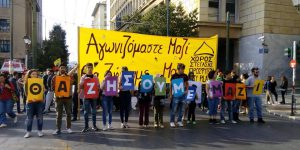 “The best in City Plaza: It is a place where you can meet many people from so many places, who come here to join us. I speak a lot with all the volunteers and activists and I get a better understanding of the European countries they come from and when I will make it out of here I have already a lot of friendships in many places. This is a gift”, says A. from Iraq who hopes that finally his application for relocation for him, his wife and two daughters will be accepted – and he hopes to find a receiving country that is giving him a chance to build up a future for them and their kids.
“The best in City Plaza: It is a place where you can meet many people from so many places, who come here to join us. I speak a lot with all the volunteers and activists and I get a better understanding of the European countries they come from and when I will make it out of here I have already a lot of friendships in many places. This is a gift”, says A. from Iraq who hopes that finally his application for relocation for him, his wife and two daughters will be accepted – and he hopes to find a receiving country that is giving him a chance to build up a future for them and their kids.
Still there are many things unsolved: As all the 54,000 refugees in the camps outside also everyone in City Plaza is suffering from the lack of a solution for their basic problem: How to leave Greece. “Until when do we have to stay here?” is what everyone thinks day and night. As everyone had started from war-torn home knowing the Balkan Route was open, finding oneself confronted with a closed border in Northern Greece, took the hope away, that was driving them along this risky escape to Europe. Despite the many opportunities and the good atmosphere in the Hotel many people are depressed and unable to even think of alternative strategies to cope with the current condition. At the same time, too many are separated from family members in other European countries since long time. In order to reunite they have to overcome the obstacle of accessing the asylum system in Greece. But this seems to be blocked totally until August, when the newly announced “pre-registration exercise” which is supposed to start end of May, should finish. So the most common things to hear among residents of the Plaza are currently:
Every day there are families outside the door and we cannot host them because all rooms are full – we need many more places like City Plaza.
And:
We appreciate all we have found here, but we are still hoping the border will open once more and we will continue our journey until we reach our final destination.
The first open assembly in City Plaza took place in the meantime. The results, as announced, correspond to what those living there described as urgent needs and wishes:
We talked about strengthening and multiplying solidarity initiatives, opening empty buildings in the centres of cities, either by solidarity initiatives or by demanding that the state do so, Organizing targeted struggles for the equal access of refugees to social services, particularly education and health care, linking struggles for refugees to struggles against class exploitation and oppression, and about living and fighting together.
In the spirit of cooperation, not competition, and with respect for the autonomy of each initiative, we discussed issues surrounding the support for and the functioning of the squat, as well as the need for a coordinated effort to act and fight for the opening of the borders, for a definitive solution for permanent housing, as well as for the social integration of economic and political refugees, pertaining to refugee access to social services, being ranted asylum to those who wish it, and of course ensuring everything is in place for refugees to continue their journeys to their destinations.
The whole declaration can be found here.
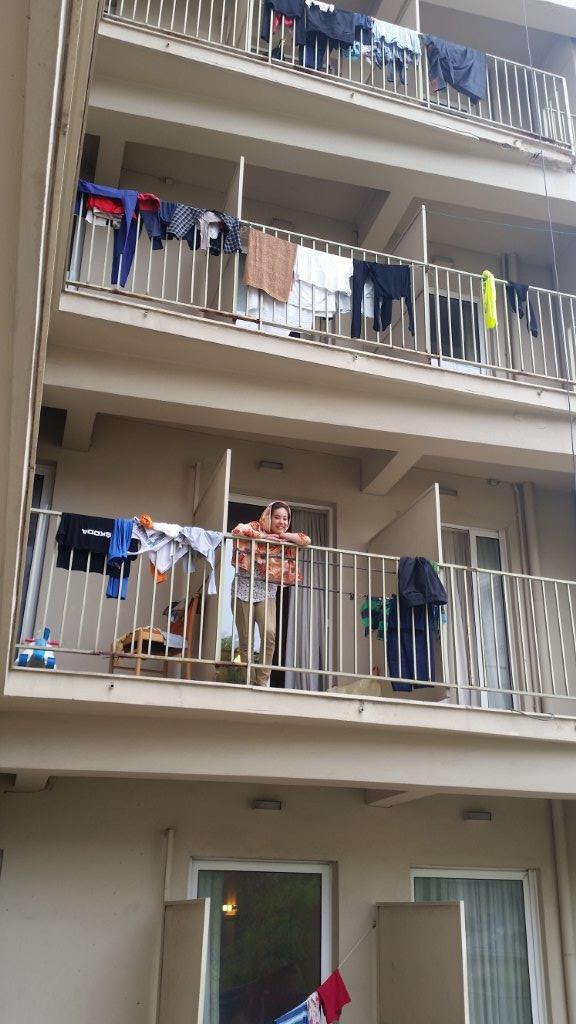 When we left the hotel we said we hoped to meet again. Maybe in Greece, maybe in Germany, maybe elsewhere. Hopefully it will be a better place. One of the minors brought it to the point: “I hope very much that I will be in Sweden with my uncle when you come back again here. But I am afraid in Sweden I will not find a place like this and that Sweden will not say welcome to me – because it seems to me that in Europe nowhere we are welcome.”
When we left the hotel we said we hoped to meet again. Maybe in Greece, maybe in Germany, maybe elsewhere. Hopefully it will be a better place. One of the minors brought it to the point: “I hope very much that I will be in Sweden with my uncle when you come back again here. But I am afraid in Sweden I will not find a place like this and that Sweden will not say welcome to me – because it seems to me that in Europe nowhere we are welcome.”
Many of the struggles of the people in City Plaza are struggles not only to be fought in Greece and not only by them. It is about Europe and the social conditions we want to live in. “We” means all of us being here and those who will come. In all the small daily struggles there is a glimpse of this question of global social rights.
The squat cannot be the solution for all of this but a vivid example of how things can be better if each of us tries. It will not solve the European shame, but it can be an outcry of solidarity: Against this European ‘closed gate’ policy that is trying to keep refugees out no matter what and that has forced the inhabitants of City Plaza to stay in a country that never was their final destination, that can never secure their basic rights – and there are many others in much worse conditions stuck in the mass camps all over Greece. It will especially not be a solution for all of those, who are still remaining outside the ‘fortress’ doors, those stuck on the Greek islands, in the so called ‘hot spots’ or even further away in Turkey, Libya, Morocco or elsewhere at the outer borders of the European Union. City Plaza is a symbol that it can be possible: Another, a welcoming Europe.
* Infomobile: information with, about and for refugees in Greece

